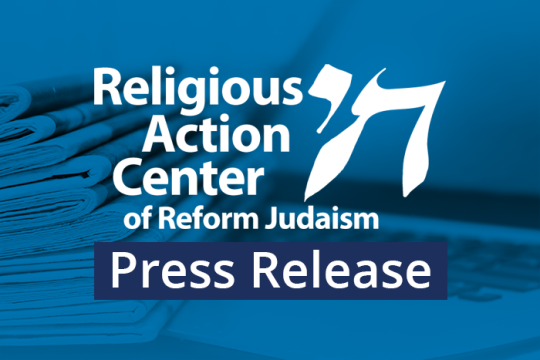October 21, 2021 - In response to the Senate filibuster of the motion to proceed to the consideration of the Freedom to Vote Act, Rabbi Jonah Dov Pesner, director of the Religious Action Center, issued the following statement on behalf of the Union for Reform Judaism and the Central Conference of American Rabbis in support of filibuster reform that achieves a proper balance between majority and minority rights in the Senate.
Dear Senator:
I write on behalf of the Union for Reform Judaism, whose 850 congregations across North America encompass approximately 1.8 million Reform Jews, and the Central Conference of American Rabbis, whose membership includes more than 2,000 Reform rabbis, to share our support for filibuster reform that balances the ability of the minority to participate meaningfully in the legislative process with the need for the Senate to advance urgent legislation effectively.
Jewish tradition celebrates the meaningful exchange of ideas and respect for minority viewpoints. The Talmud (Eruvin 13b), the collection of Jewish law and ethics, teaches of debates between the Houses of Hillel and Shammai, “These and these are both the words of the Living God.” The Talmud even goes so far as to preserve the opposing and minority opinions in its text, alongside the consensus viewpoint. We recognize there may be truth and wisdom in opposing views and we value wrestling with and trying to reconcile such conflicting opinions. Likewise, a healthy democracy requires the constant balancing of majority and minority rights and voices.
In the American political tradition, the Senate filibuster has been characterized as a means of ensuring the minority’s voice is heard in the Senate and, in theory, may also promote deliberation, bipartisanship, and compromise. Yet the filibuster is also used to obstruct legislative business. The most memorable uses of the filibuster have been to thwart attempts to pass civil rights statutes in the 1950s and 1960s. Since the procedural change leading to the silent filibuster more than five decades ago, a growing body of evidence shows that today’s filibuster has contributed to political stalemate and obstruction by the minority.
In the past decade, much like the 1950s and 1960s, amending and updating civil rights legislation has become a necessity. In 2013, the Supreme Court’s misguided decision in Shelby County v. Holder gutted the Voting Rights Act of 1965 (VRA) by stripping the federal government of its ability to prevent states with histories of discriminatory voting practices from imposing new voter restrictions and calling on Congress to update the VRA. States previously under preclearance did not wait to enact new anti-voter laws that had previously been struck down by federal courts or the Justice Department. Within 24 hours of the ruling, Texas announced that it would implement a strict photo ID requirement for voting and in the years since, dozens of new anti-voter laws have been put in place.
Since the 2020 elections, which drew the highest turnout in the U.S. in over a century, many state legislatures have made passing new restrictive voting laws a priority. In less than a year, 19 states have enacted 33 laws that restrict the right to vote. And earlier this year, the Supreme Court did further damage to protections within the Voting Rights Act by making it significantly harder to challenge voting laws under Section 2. As a result, voters across the United States, especially Black, Latinx, and Native American voters, will continue to face more barriers than white voters to making their voices heard in local, state, and federal elections.
The wave of anti-voter legislation being enacted at the state level and the Supreme Court’s decisions that have weakened federal oversight demand action by the Senate. However, as we just witnessed with the Freedom to Vote Act, the filibuster is being used once again to prevent even debating legislation protecting Americans’ civil rights. We are saddened that rather than encouraging compromise between senators with differing views, the modern filibuster allows senators to avoid the need to compromise – or even to debate. The modern filibuster is fundamentally voiceless, secretive, and obstructionist and the filibuster of the Freedom to Vote Act is upholding and strengthening systemic racism as states move forward to enact laws that disproportionately harm voters of Color and other marginalized communities.
As Reform Jews, we value debate and are mindful that elimination of the filibuster can be used to promote tyranny as easily as justice. We therefore seek to reform the filibuster to accomplish its worthy goal of ensuring minority views are heard, which has been lost through a series of procedural changes that encourage its abuse.
We strongly support reforms to the filibuster that would contribute to dialogue and debate. Specifically, we support restoring the “talking filibuster,” eliminating duplicative filibuster opportunities, ending the practice of silent holds, expanding opportunities for the minority to offer amendments, and considering a lower number of senators needed to invoke cloture under certain circumstances. Together, these changes promise to return the Senate to its status as the world’s greatest deliberative body.
We strongly believe filibuster reform has the potential to contribute to dialogue and achieving a proper balance between majority and minority rights in the Senate. It is our sincere belief that filibuster reform offers the best path forward for American democracy and the interests of all Americans. We urge you to enact reform so that the Senate may move forward with considering critical civil rights legislation and other urgent priorities.
Sincerely,
Rabbi Jonah Dov Pesner


